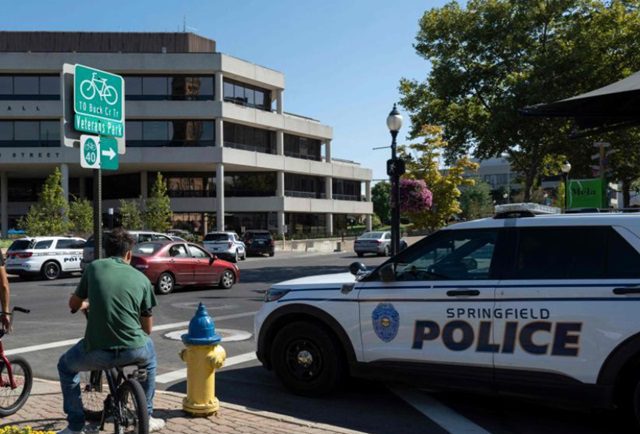BTN News: A bomb threat forced the evacuation of the Springfield City Hall in Ohio after a wave of misinformation falsely claimed that Haitian migrants were attacking and eating pets in the area. The alarming situation, which unfolded in the small city of 60,000 residents, escalated rapidly following repeated statements by former President Donald Trump and his supporters, perpetuating a baseless conspiracy theory. Local authorities and fact-checkers, including the AFP, have categorically debunked these claims, warning that such inflammatory rhetoric poses a real danger to communities and public safety. The incident has intensified tensions in Springfield, prompting community leaders to call for calm.
Evacuation Orders After Bomb Threat
Springfield, Ohio, was thrown into turmoil after a bomb threat was directed at several local agencies, including the city hall, forcing an immediate evacuation. Authorities announced the closure on social media, stating, “Due to a bomb threat sent today to several organizations in Springfield, City Hall is closed.” The threat followed days of unrest sparked by unfounded rumors that migrants from Haiti were consuming pets.
Baseless Claims Trigger Fear and Confusion
The rumors that triggered this chaos began with a social media post from an alleged local resident, who cited a dubious source claiming Haitian neighbors were attempting to eat their cat. Despite the clear lack of evidence, this baseless accusation quickly spread. Prominent figures, including Donald Trump, amplified the false narrative. On Tuesday, during a televised debate, Trump reiterated the claims, stating that “Ohio is overwhelmed by undocumented migrants, many from Haiti, taking over towns and cities at an unprecedented rate.”
Community Leaders Seek to Defuse Tensions
In response to the growing fear and misinformation, local clergy members held a press conference, calling for unity and understanding. “Today we faced threats of violence,” said Wes Babian, a former pastor at a local Baptist church. Clergy gathered, prayed together, and emphasized the need for solidarity amid the escalating tension. These efforts come as Springfield residents grapple with the immediate aftermath of the bomb threat and the damaging impact of false accusations.
Police and Fact-Checkers Denounce Misinformation
Local police and content verification organizations, like AFP, have firmly denied the claims, affirming there is no evidence to support allegations against Haitian migrants. “This kind of disinformation is dangerous,” said John Kirby, National Security Council spokesman, warning that people might believe these absurd and offensive statements, potentially leading to harmful actions.
Haitian Community Caught in the Crossfire
Members of Springfield’s Haitian community, like Mackenso Roseme, find themselves living in fear. After learning of the bomb threat, Roseme, who works at an Amazon warehouse in nearby Dayton, rushed to his child’s school, only to find a notice that all children had been evacuated. “The current situation is really concerning,” Roseme told AFP. “I’m stressed. I feel like something could happen.”
Racism Fuels Dangerous Conspiracy Theories
The White House has condemned the spread of these racist conspiracy theories, labeling them as “dangerous misinformation.” Karine Jean-Pierre, White House Press Secretary, stated, “It’s the spread of filth that endangers lives in communities that are being slandered.” Officials urge the public to be vigilant against such divisive narratives, emphasizing the need for truth and factual reporting.
A Community on Edge: Calls for Calm and Rationality
Amid the chaos, Springfield’s residents are left grappling with the impact of falsehoods gone viral. The ongoing situation has brought a renewed focus on the power of misinformation and its potential to incite real-world violence. As community leaders advocate for calm and reason, there remains a palpable sense of uncertainty in the air.
Conclusion: A Wake-Up Call for Media Responsibility
The recent events in Springfield underscore the dangers of misinformation and its capacity to incite fear, violence, and division within communities. As the city recovers from the bomb threat and the fallout of baseless claims, there is a growing call for responsible communication and unity. Misinformation, especially when fueled by high-profile figures, has proven to have serious consequences. Springfield serves as a stark reminder of the need for accuracy, empathy, and truth in public discourse.


